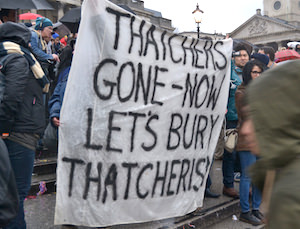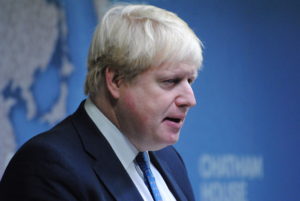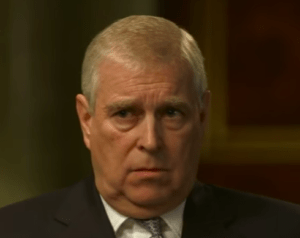The Battleground of Thatcher’s Memory
Thousands of protesters gathered at London's Trafalgar Square on Saturday to celebrate the death of Margaret Thatcher. The event marked the end of a bizarre and remarkable week in the U.K., characterized by a polarized response to the demise of the longest serving British prime minister in living memory. But the struggle to decide her legacy continues.The struggle to decide the former prime minister's legacy continues.
By Charlie WilliamsMaggie! Maggie! Maggie! Dead! Dead! Dead!
Those words were chanted by the thousands of protesters who gathered at London’s Trafalgar Square on Saturday to celebrate the death of Margaret Thatcher. The event marked the end of a bizarre and remarkable week in the U.K., characterized by an absolutely polarized response to the demise of the longest serving British prime minister in living memory. The history of Thatcher is once again being reconstructed and reimagined. Although she was finally laid to rest Wednesday, people from across the political spectrum will continue to compete in their attempts to revise her complicated legacy.
At one end, leaders from around the world have expressed their respect and admiration for a woman who, in current Prime Minister David Cameron’s words, “made Britain great again.” For many people across the U.K. however, Thatcher and Thatcherism continue to leave a bitter taste in the mouth. The announcement of her death April 8 inspired not only national mourning, but also a series of celebrations across the country, some of which were impromptu, others planned for decades. Contempt for Maggie and her policies still runs deep.
In the U.K. it is traditional to loathe politicians, especially those we elect to office. In 2003, then-Prime Minister Tony Blair received the top prize in a national television poll dedicated to finding the “worst person” in Britain. Despite this accolade, he still managed to win a third general election two years later.
More recently, in summer 2012, Britain’s chancellor of the exchequer and Cameron’s right hand man, George Osborne, was invited to present medals during an award ceremony at the Paralympic Games. An audible boo erupted across the stadium as Osborne’s name was announced. The chancellor laughed nervously and for a brief moment seemed to share the aspirations of the audience members, who hoped that the ground might open up and swallow him whole.
Given that we love to hate our politicians so dearly, it is unsurprising that Thatcher continues to inspire so much resentment.
As someone who found it slightly unnerving when Americans took to the streets of New York and Washington, D.C., after the death of Osama bin Laden in May 2011, I found the death party of an 87-year-old lady with Alzheimer’s to be an altogether unsavory affair.
The theme of dancing on Thatcher’s grave was heavy in the air Saturday. Disfigured effigies of the Iron Lady were lovingly constructed and zealously destroyed. Torrential rain did little to dent the bitter enthusiasm of the protesters, and as darkness fell and live bands began to play, the atmosphere turned increasingly carnivalesque. Clashes with an abundantly present police force were inevitable.
Everyone had his or her own reasons for being at Trafalgar Square and for hating Maggie T. Some came to remember the victims of the Falklands War, or to pay tribute to the memory of Bobby Sands and the Irish hunger strikers. Many others continue to regard the poll tax, privatization and the disempowerment of the unions as some of the cruelest political injustices in modern British history. According to one demonstrator, the 1980s defined a class war in which Thatcher intended to leave workers “emasculated and on their knees.” A handful of people at the gathering told proud stories of how they marched on Trafalgar during the Poll Tax Riots of 1990.
Most people over the age of 25 had at least one personal story to tell, showing how Thatcherism directly affected their lives and those of their families. Many were forced to relocate from industrial communities in search of work, and suffered periods of intense poverty as a result. One Liverpool native described how the prime minister had “poisoned his life” ever since he was forced to leave home after losing his job in the Merseyside docks during the 1980s. By far the loudest cheer of the evening erupted as the banner bearing the emblem of The North East Area National Union of Mineworkers began making its way through the crowd. Everyone present offered the utmost respect for the mining communities decimated by Thatcherism. Although steeped in 1980s anti-Thatcher nostalgia, protesters also wished to demonstrate against the continuing legacy of Thatcher and its ubiquitous influence on contemporary mainstream British politics. Thatcher’s death comes at a poignant time, in an era of National Health Service reforms, public spending cuts and “bedroom” taxes that echoes a decade of poll taxes, privatization and the deconstruction of the welfare state. One member of the Socialist Workers Party explained:
“I think particularly because of what Cameron and Osborne are doing, it [Thatcher’s death] has caught a nerve. That’s why people have come out and celebrated, because they recognize that what Cameron is doing today very much stands in the tradition of the class war that Thatcher waged. And just as people fought back under Thatcher, we need to take that struggle forward today.”
Despite the variety of reasons that brought people out Saturday, there was one sentiment that seemed to be held by the majority. Many were upset by the response to Thatcher’s death in the global and mainstream media. One woman described hearing U.S. President Barack Obama’s speech dedicated to Thatcher as “rubbing salt in the wounds” of the people her policies affected. I asked one member of the Socialist Party how he wanted the day to be remembered.
“Today’s protests truly reflect how people felt about Margaret Thatcher,” he said. “Although it is quite small, most people I know — and I’m from a normal working-class background — celebrated when she died. This really reflects how people feel about Thatcher. … At the moment you have media, politicians and figures from big business who are eulogizing over Thatcher, giving a rose tinted view of her time in power and the legacy she has left behind. But this protest really gives us a chance to talk about the real legacy in terms of the untold suffering she caused to millions of working-class people not just in Britain but across the world as well.”
A statement made by one of the flag bearers for The North East Area National Union of Mineworkers noted:
“We haven’t come here to insult anybody. We have come here to tell you there is a different point of view than the one that the media has been pushing and ramming down our throats all week, and if the family of Mrs Thatcher feels insulted, our families are mortally insulted by the eulogizing of a woman who absolutely destroyed our communities and our ways of life.”
This expression highlights why Thatcher’s death has been so important and why so much has been written about it. As her life, legacy and history is rewritten and reimagined, people want the opportunity to tell their side of the story.
Glenda Jackson, one of the few members of Parliament who spoke out against Thatcher in the House of Commons last week, described how under Thatcherism “everything I had been taught to regard as a vice … came to be regarded as a virtue.” In politics, the media and popular culture, the story of Thatcher is hotly contested territory because it shapes how we understand the ideology of Thatcherism and whether its tenets should be regarded as vice or virtue.
Those who attended Saturday’s protest were no doubt disappointed by the lack of media coverage of the event, especially from the BBC. They were equally disappointed by the low turnout of Labor and Liberal democrat backbenchers, who declined to provide a “different point of view” at the April 10 parliamentary debate concerning the life and legacy of the deceased prime minister. Yet, as admirers and mourners watched the funeral procession Wednesday, they were joined by a handful of demonstrators who stood with their backs turned to the cortege as a deliberate mark of disrespect.
The former prime minister remains the most divisive figure in British politics, and what Thatcherism means and how the Iron Lady should be remembered will be a political battleground for generations to come.
Charlie Williams is a writer living in London.
Your support matters…Independent journalism is under threat and overshadowed by heavily funded mainstream media.
You can help level the playing field. Become a member.
Your tax-deductible contribution keeps us digging beneath the headlines to give you thought-provoking, investigative reporting and analysis that unearths what's really happening- without compromise.
Give today to support our courageous, independent journalists.






You need to be a supporter to comment.
There are currently no responses to this article.
Be the first to respond.